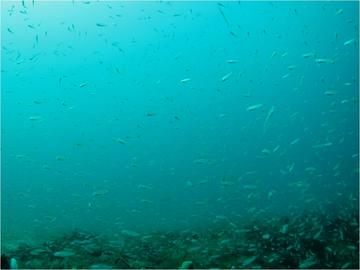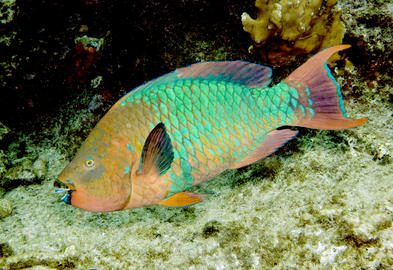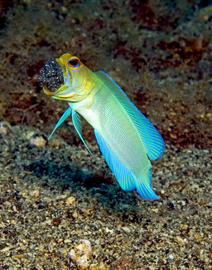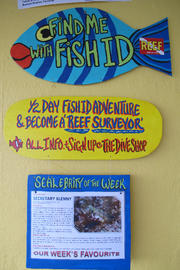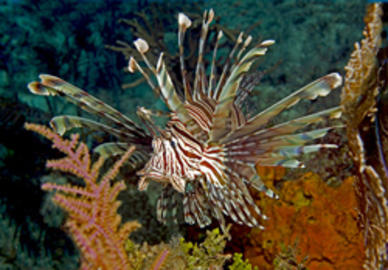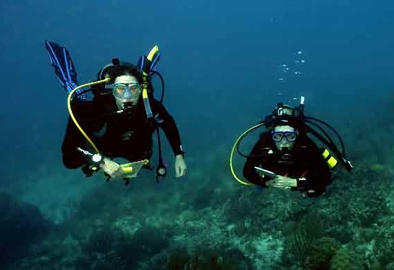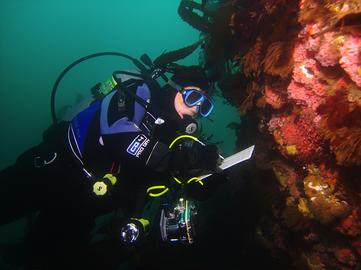REEF Advanced Assessment Team Member, Dave Grenda, recently co-authored a paper documenting behavioral observations of young Great Barracuda occurring on live bottom sub-tropical reefs primarily at Gray's Reef National Marine Sanctuary off the coast of Georgia. For the past three years Dave assisted University of Connecticut researcher, Dr. Peter Auster, in studying behavioral interactions of piscivores and their prey.
Every month, scientists, government agencies, and other groups request raw data from REEF’s Fish Survey Project database. Here is a sampling of who has asked for REEF data recently and what they are using it for:
- Scientists from NOAA Fisheries are using REEF data to conduct stock assessments on parrotfishes in Puerto Rico and US Virgin Islands.
Thanks to everyone who donated during our Summer Campaign, you helped us reach our goal. REEF members contributed over $34,770, with a generous match of $30,000 from the Curtis and Edith Munson Foundation, for a grand total of $64,770. REEF will use these donations to maintain our current programs and expand our special projects, the Grouper Moon Project and the Lionfish Research Program. Donations from our members make it possible for REEF to carry out our mission of conserving marine ecosystems. Thank you!
REEF members are at the heart of our grassroots marine conservation programs. Over 43,000 divers, snorkelers, students, and armchair naturalists stand behind our mission.
This month we highlight Jim Pendergrass (REEF member since 2008). To date, Jim has conducted 113 surveys along the west coast from California to British Columbia, and he is a member of the Pacific Advanced Assessment Team. Here's what Jim had to say about REEF:
REEF is proud to partner with over 130 dive shops, dive clubs, individuals, and other organizations as REEF Field Stations.
When you call the REEF office, you may be greeted with a new voice. Please join us in welcoming Martha Klitzkie as the new General Manager. After completing a Bachelor of Arts from Warren Wilson College, a passion for marine education led her to serve as the Education Director at the Pigeon Key Foundation in Marathon, Florida. She later went on to direct a larger marine education program based at Camp Ocean Pines, located on the central coast of California. During this time she also completed a Master of Arts in Educational Leadership and Administration from Argosy University.
Lad Akins, REEF Director of Special Projects, recently co-authored a paper summarizing work documenting feeding patterns of lionfish in the Bahamas. Understanding the predation behavior of this invasive species is important to be able to predict and mitigate the effects of Indo-Pacific lionfish (Pterois volitans) on Caribbean fish communities. Lad and his colleagues at Simon Frasier University studied the activity levels and prey consumption rates of lionfish on 12 shallow coral reefs in the Bahamas in relation to time of day and prey availability.
REEF Field Surveys are a great introduction to fish identification for novice fishwatchers, and are a fun way for experienced surveyors to build their life list while interacting with fellow fishwatchers. REEF staff, board members, and other REEF instructors lead these trips, and each features daily classroom seminars and a full diving schedule. Don't miss out, spaces are filling up for our 2012 trips. The schedule and more details are posted online at www.REEF.org/trips.
REEF members are at the heart of our grassroots marine conservation programs. Over 43,000 divers, snorkelers, students, and armchair naturalists stand behind our mission.
This month we highlight Sally Davies (REEF member since 2004) and her sister Helen Davies (REEF member since 2006). Collectively they have conducted 100 surveys, and both participated in the recent inaugural South Pacific REEF Trip (more on that next month!). Here's what Helen had to say about REEF:
Every month, scientists, government agencies, and other groups request raw data from REEF’s Fish Survey Project database. Here is a sampling of who has asked for REEF data recently and what they are using it for:
- NOAA scientists from the Protected Resources Division are using data on three species of endangered rockfish to evaluate their status in the Salish Sea.
-University of Washington scientists are using REEF data on invasive tunicates to map distribution of the species throughout the Pacific Northwest.

